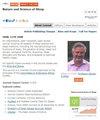Sex Differences in the Associations Between Chronic Diseases and Insomnia Symptoms Among Older Adults in India
IF 3.4
2区 医学
Q2 CLINICAL NEUROLOGY
引用次数: 0
Abstract
Background: Sleep problems are a critical issue in the aging population, affecting quality of life, cognitive efficiency, and contributing to adverse health outcomes. The coexistence of multiple diseases is common among older adults, particularly women. This study examines the associations between specific chronic diseases, multimorbidity, and insomnia symptoms among older Indian men and women, with a focus on the interaction of sex in these associations.Methods: Data were drawn from 31,464 individuals aged 60 and older in the Longitudinal Ageing Study in India, Wave-1 (2017– 18). Insomnia symptoms were assessed using four questions adapted from the Jenkins Sleep Scale (JSS-4), covering difficulty falling asleep, waking up, waking too early, and feeling unrested during the day. Multivariable logistic regression models, stratified by sex, were used to analyze the associations between chronic diseases and insomnia symptoms.
Results: Older women had a higher prevalence of insomnia symptoms than men (44.73% vs 37.15%). Hypertension was associated with higher odds of insomnia in both men (AOR: 1.20) and women (AOR: 1.36). Women with diabetes had lower odds of insomnia (AOR: 0.80), while this association was not significant in men. Neurological or psychiatric disorders, stroke, and bone and joint diseases were linked to higher odds of insomnia in both sexes. Chronic lung disease was associated with insomnia in men (AOR: 1.65), but not in women. Additionally, having three or more chronic diseases significantly increased the odds of insomnia in both men (AOR: 2.43) and women (AOR: 2.01).
Conclusion: Hypertension, bone and joint diseases, lung diseases, stroke, neurological or psychiatric disorders, and multimorbidity are linked to insomnia symptoms in older Indian adults. Disease-specific management and routine insomnia screening are crucial for promoting healthy aging in this vulnerable population.
印度老年人慢性病与失眠症状之间的性别差异
背景:睡眠问题是老龄人口的一个关键问题,它影响生活质量和认知效率,并导致不良的健康后果。多种疾病并存是老年人,尤其是女性老年人的常见病。本研究探讨了印度老年男性和女性中特定慢性疾病、多病共存和失眠症状之间的关联,重点关注性别在这些关联中的相互作用:数据来自印度老龄化纵向研究第一波(2017-18 年)中的 31,464 名 60 岁及以上的老年人。失眠症状使用改编自詹金斯睡眠量表(JSS-4)的四个问题进行评估,包括入睡困难、醒来困难、过早醒来和白天感觉不安宁。多变量逻辑回归模型按性别分层,用于分析慢性病与失眠症状之间的关联:结果:老年女性的失眠症状发生率高于男性(44.73% 对 37.15%)。高血压与男性(AOR:1.20)和女性(AOR:1.36)较高的失眠几率相关。患有糖尿病的女性失眠几率较低(AOR:0.80),而男性的这一相关性并不显著。神经或精神疾病、中风以及骨关节疾病与男女失眠几率较高有关。慢性肺部疾病与男性失眠有关(AOR:1.65),但与女性失眠无关。此外,患有三种或三种以上慢性疾病会显著增加男性(AOR:2.43)和女性(AOR:2.01)的失眠几率:结论:高血压、骨关节疾病、肺部疾病、中风、神经或精神疾病以及多病与印度老年人的失眠症状有关。针对特定疾病的管理和常规失眠筛查对于促进这一弱势群体的健康老龄化至关重要。
本文章由计算机程序翻译,如有差异,请以英文原文为准。
求助全文
约1分钟内获得全文
求助全文
来源期刊

Nature and Science of Sleep
Neuroscience-Behavioral Neuroscience
CiteScore
5.70
自引率
5.90%
发文量
245
审稿时长
16 weeks
期刊介绍:
Nature and Science of Sleep is an international, peer-reviewed, open access journal covering all aspects of sleep science and sleep medicine, including the neurophysiology and functions of sleep, the genetics of sleep, sleep and society, biological rhythms, dreaming, sleep disorders and therapy, and strategies to optimize healthy sleep.
Specific topics covered in the journal include:
The functions of sleep in humans and other animals
Physiological and neurophysiological changes with sleep
The genetics of sleep and sleep differences
The neurotransmitters, receptors and pathways involved in controlling both sleep and wakefulness
Behavioral and pharmacological interventions aimed at improving sleep, and improving wakefulness
Sleep changes with development and with age
Sleep and reproduction (e.g., changes across the menstrual cycle, with pregnancy and menopause)
The science and nature of dreams
Sleep disorders
Impact of sleep and sleep disorders on health, daytime function and quality of life
Sleep problems secondary to clinical disorders
Interaction of society with sleep (e.g., consequences of shift work, occupational health, public health)
The microbiome and sleep
Chronotherapy
Impact of circadian rhythms on sleep, physiology, cognition and health
Mechanisms controlling circadian rhythms, centrally and peripherally
Impact of circadian rhythm disruptions (including night shift work, jet lag and social jet lag) on sleep, physiology, cognition and health
Behavioral and pharmacological interventions aimed at reducing adverse effects of circadian-related sleep disruption
Assessment of technologies and biomarkers for measuring sleep and/or circadian rhythms
Epigenetic markers of sleep or circadian disruption.
 求助内容:
求助内容: 应助结果提醒方式:
应助结果提醒方式:


